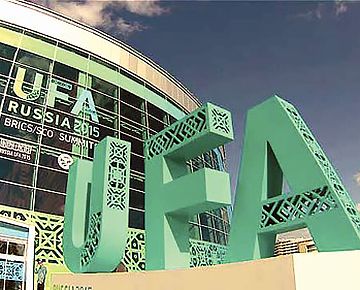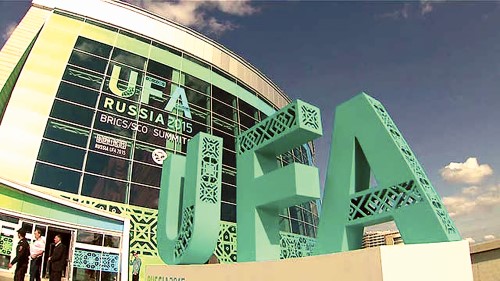
While Belarus itself is not a BRICS or Shanghai Co-operation Organisation member, it does however, enjoy close partner relations with almost all their participating states. As regards membership, the Shanghai Co-operation Organisation is an expanded version of the Eurasian Economic Union — uniting Russia, China, Kazakhstan, Tajikistan, Kyrgyzstan and Uzbekistan. When establishing this club, the focus was on interaction between the states with the additional goal of strengthening regional security. Over the course of time, the regions involved have discovered many other spheres of mutual interest; these primarily aim at contributing to the economic development of the states in question. Since Belarus is playing an increasingly important role in these processes, its participation in the inter-state dialogue seems logical and necessary.
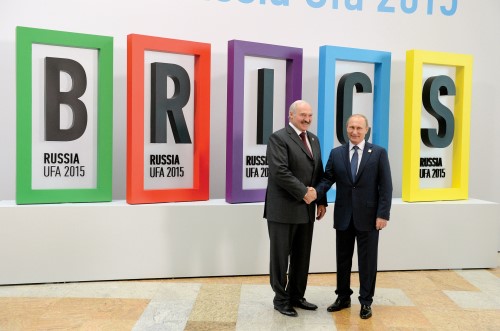
On arrival in Bashkortostan’s capital, Alexander Lukashenko met his Russian colleague, Vladimir Putin.
Presidents of Belarus and Russia shared their thoughts during their bilateral meeting in Ufa
Vladimir Putin:
Belarus is our closest neighbour and a strategic partner. The country is our ally. We co-operate in all areas including military and humanitarian spheres, while solving social issues to meet our citizens’ interests. We are developing co-operative ties as part of the Union State and the Eurasian Economic Union, and have many important plans in mind. The task of enhancing Belarus’ status within the Shanghai Co-operation Organisation is in focus and the issue is virtually settled. Belarus will gain observer status at this authoritative international organisation whose role is increasing in the modern world. We are convinced that your participation in the Shanghai Co-operation Organisation’s activity would benefit Belarus and other participants of the process.
Alexander Lukashenko:
We are keen to discuss three sets of issues. Firstly, I’m grateful for the opportunity of meeting presidents from other states. The second set of issues deals with the Eurasian Economic Union’s problems, especially those relating to Kyrgyzstan’s joining the WTO. The third point is to say that we appreciate your assurance that Belarus is the closest state for the Russian Federation’s President. Whilst we have had some problems in our bilateral relations and experience difficulties from time to time, at present, we are able to discuss what steps should be taken to overcome any future possible negative issues.
One of the key decisions taken by the summit was to enhance Belarus’ status from a partner to an observer.
The BRICS interstate union is steadily transforming into an important counterbalance in the complicated processes of the global economy. This was voiced by the Belarusian President in his speech at the meeting of the BRICS heads and leaders of the invited states.
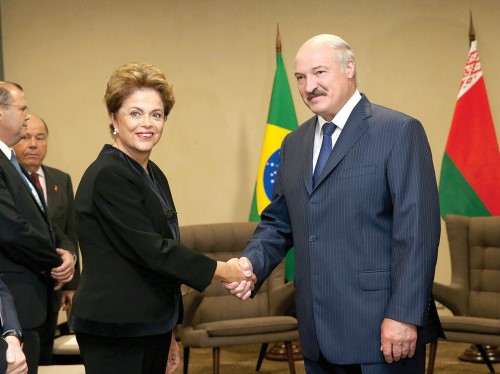
According to Mr. Lukashenko, the BRICS members give unconditional aid and mutual support. They do not strive to impose their will on other states and, at present, the BRICS states are true engines of economic development, which is especially important for stabilising the global economic situation. They help other countries ensure post-crisis revival and, moreover, all BRICS members are becoming integration hubs in their regions. Such an approach meets Belarus’ philosophy.
Ufa’s Congress Hall hosted the summit of the BRICS heads of state and, as it ended, a large meeting of its participants took place. The Belarusian President’s tough working schedule in the Russian city began in advance of the major event when Mr. Lukashenko set up meetings with several heads of state.

His working day began with talks with the President of Brazil, Dilma Rousseff. In the amenable and constructive dialogue, the heads of state paid attention to the high level of our turnover at almost $1bn. However, this impressive sum has not yet fully reached its potential. Minsk and Brazil enjoy good prospects for expanding their co-operation in the aviation and agro-industrial spheres. In their discussion, the presidents outlined some firm plans for promising joint projects. Belarus currently buys Embraer planes from Brazil. Our country has well trained staff and the necessary production base to establish a regional centre of technical maintenance for these aircraft. Ms. Rousseff expressed interest in the initiative. An agreement has also been achieved to set up a production cluster in Brazil to manufacture agricultural machinery, heavy-duty trucks and tractors at joint facilities. The two presidents agreed that, in the future, four or five major areas of interaction would be defined; these will be overseen by a special inter-state commission (to be formed under the heads of state’s decision). At the end of the meeting, Mr. Lukashenko invited Ms. Rousseff to visit Belarus at her convenience; the Brazilian President accepted the invitation.

On meeting Afghanistan’s President — Ashraf Ghani, Mr. Lukashenko reminded him of a recent telephone conversation between the heads of state and the visit of Afghanistan’s special representative to Minsk soon after. These events promised even greater co-operation. As the Belarusian President noted, the world is interested in a strong and stable Afghanistan as a reliable shield against diverse threats from the region. At the same time, Afghanistan occupies a strategic position in Asia, boasting a significant transit potential. The reliability of its transport arteries is also extremely important for many states. With this in mind, Mr. Lukashenko expressed an opinion that heads of states (gathering in Ufa) need to unite to strengthen Afghanistan. Belarus would not stay on the sidelines of this. Mr. Ghani accepted the Belarusian leader’s sentiments with gratitude.
The presence of a mutual interest in expanding co-operation was also acknowledged during Mr. Lukashenko’s meeting with the President of Mongolia — Tsakhiagiin Elbegdorj. We have products to trade, in addition to developments of mutual interest. We also remember our successful co-operation in the past. The Mongolian Head of State shared the view, noting that his country is well aware of Belarusian tractors, lorries, BelAZ trucks, refrigerators and ‘Minsk’ motorcycles. This is probably the basis upon which strong collaboration should be built. Mr. Lukashenko proposed an exchange of delegations of specialists to make firm development plans.

Belarus enjoys long lasting and warm partner relations with Iran. As Mr. Lukashenko noted on meeting the Iranian President Hassan Rouhani, our two countries have had to overcome some serious obstacles in the past, related to outside pressure. Thankfully, these issues are in the past and it’s time to look into the future with optimism. Mr. Rouhani confirmed Tehran’s readiness to strengthen ties with Minsk.
Talks and negotiations were later continued in a major meeting of the heads of state. While delivering his speech in front of his colleagues, Mr. Lukashenko paid attention to the uniqueness of the direct dialogue observed those days between the BRICS leaders and other states participating in the forum. This is a good basis to expand inter-state interaction. Such approaches meet Minsk’s philosophy of integration. Belarus is a firm BRICS ally ready to actively join any avenue of co-operation with the organisation. The President of Belarus assured all those present that our country can be truly called a member of the ‘BRICS club of friends’. We are a reliable and predictable partner, having no conflict on its territory and creating no problems for its neighbours. We are in a good position to ensure the security of our common borders and the safe transit of energy resources. Belarus also efficiently counteracts drug trafficking and illegal migration, pursuing a peaceful foreign policy. This year, the country chairs the Eurasian Economic Union and is ready to support special formats of our economic union’s interaction with the BRICS.

It’s likely that these approaches will open up the possibilities of a closer interaction between Belarus and the BRICS states in the future. Behind the scenes at the forum, Belarus’ First Deputy Prime Minister, Vasily Matyushevsky, noted that, on acquiring an observer status with the Shanghai Co-operation Organisation, the country needs to achieve a similar rapprochement in its relations with the BRICS. This process looks logical: the world is constantly producing new threats and even major states are unable to counteract them when acting alone. Accordingly, projects of regional integration are playing an increasing role in securing nations.
Mr. Lukashenko’s intensive working schedule in Ufa confirms the key: the country is stably and purposefully pursuing a multi-vector foreign policy. Belarus is ready for an open, constructive and trust-based dialogue with any state, on an equal footing and mutually respectful basis.
МТ’S REFERENCE:
Heads of State of the BRICS members have adopted the Ufa Declaration which assesses the present political and economic situation in the world, while reflecting BRICS members’ approaches to the most topical issue of multilateral co-operation. In particular, the document highlights the UN’s key role in searching for solutions to global problems.
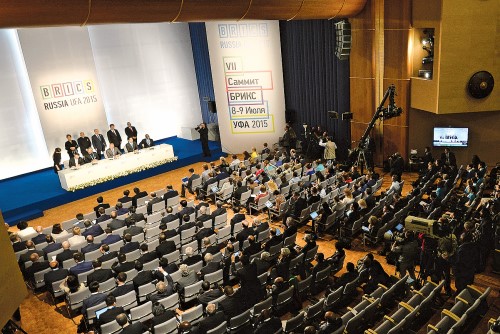
In addition, the declaration condemns terrorism in all its forms and manifestations. The document mentions the terrorist organisations of Islamic State, Al-Nusra Front and associated groups who are condemned for all forms of violence regarding civilians, particularly that against children and women.
The BRICS member states have also expressed their concerns over the Ukrainian crisis. The document reads: ‘We stress that the conflict has no military solution and the single way to peace lies through a political dialogue. In this respect, we call upon all states to meet the provisions of the complex of measures to fulfil Minsk’s agreements — adopted in February 2015 in Minsk by a contact group on Ukraine and supported by the heads of Russia, Germany, France and Ukraine (and approved by the UN Security Council in its 2202 resolution’.
The heads of the participating states have also adopted the so-called plan of action outlining the BRICS activity in the forthcoming year. The document stipulates the major avenues of the states’ interaction.
A strategy of economic partnership of the BRICS member states (until 2020) has become another final document adopted under Russia’s initiative. It aims at the expansion of business co-operation to facilitate social-economic development and enhance the competitiveness of BRICS participants in the global economy.
By Vasily Kharitonov









